http://www.royalgazette.com/siftology.royalgazette/index.jsp
![]()
Article published Oct 28, 2006
Saturday Spotlight
STRAY OF HOPE
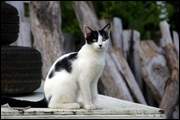
Fifteen years ago, before Bermuda Feline Assistance Bureau (BFAB) was set up, stray cats in Bermuda didn’t stand much chance of survival if caught.
According to Juliet Wilkinson, a bureau volunteer who spends four nights a week
trapping cats in order for them to be neutered or spayed, rounded-up pussies
were automatically put down, regardless of their health.
Thankfully, things have changed. Since 1992, the bureau has been on a mission to
keep the number of cats at an acceptable level with its trap, neuter and release
programme.
Animal lover Juliet, a mother-of-three and grandmother-of-seven who thinks
nothing of travelling from the east to the west of the Island and back again in
a night to catch kitties, says the scheme is a humane way of stopping the
population increasing.
Juliet’s job is to lay the traps – wire cages with a door which snaps shut when
the cat steps inside to retrieve food – around the Island when people call the
bureau to report strays.
On Tuesday night, her first stop is a farm in Pembroke where she set a trap
earlier in the day to catch a feral feline which has already delivered three
kittens.
Farmer’s wife Philomena DeSilva is more than happy to feed the cat and care for
its kittens – but she doesn’t think the farm can cope with any more little ones
running around.
She has asked the bureau to help out – and Juliet is only to happy to assist.
But while the trio of cute kittens – Gracie, Callie and Francine – dash about,
there is no sign of mum.
“They seem to know when you are coming around,” laughs Juliet, peering into the
empty cage, which is hidden under a blanket. “But I won’t give up until I’ve got
her.”
Each night, Juliet trawls the Island laying traps, checking cages and dropping
off animals at the two hospitals which carry out the surgery at a discounted
rate for the bureau: Endsmeet in Devonshire and Hannover Veterinary in St.
David’s.
On Tuesday, Juliet collects two cats at Hannover – a male and female who were
operated on that day. Both will be taken back to the exact spot where they were
caught, as are all the mature animals trapped by the bureau.
By returning them to the same place, other cats are put off from entering the
area and the “colony” can stabilise. The surgery reduces mating and fighting,
meaning less noise.
Vet Dr. Jan Cieters explains that the castration of males take about 30 seconds
while spaying females is a 20-minute job. Neutering costs about $50 and spaying
more than $100.
The cats, who are also de-wormed and de-flead at the hospitals, are usually
given their anaesthetic intramuscularly while still in the cage and are
completely alert by the time they return to the outdoors.
While under the anaesthetic, the cats have their ears tagged at Hannover or the
very left tip of their ear removed at Endsmeet to show that they have had
surgery.
All the cats are tested for FIV (the feline equivalent of HIV) and leukaemia.
Those testing positive for either, usually just a few each month, are put down.
“FIV is under control because of all the testing and neutering,” says Juliet.
“It didn’t used to be that way but it’s definitely improved.”
Some of the animals caught by volunteers, especially the kittens, get adopted.
But the majority of older strays are unwanted and fend for themselves, with the
help of “feeders” – cat lovers stationed all over Bermuda who put out food for
them.
Juliet drops into one such station in Warwick where she disappears into the
bushes to make sure the green feeding box, safe from birds and rodents, has
enough supplies for the night.
“About 18 cats live here,” says Juliet. She points to a kitten which dances
around our feet and doesn’t shy away when the photographer takes its picture.
“That must have been dumped here; it’s too friendly to be feral.”
She says domestic cats who are dumped by their owners quickly adapt. “They are
hunters. If you miss a feeding night you don’t worry too much because they can
go and hunt. If they are forced back into nature it all clicks back into place.”
A fat older cat wanders by. Juliet wonders if she’s pregnant. Both animals will
hopefully be trapped eventually and operated on.
Juliet has never received so much as a scratch in the year she’s been
volunteering, thanks to the way the cats are caught. And she says most strays
are timid, rather than vicious.
She’d encouraged anyone who loves animals to help with the programme – and the
bureau certainly needs more volunteers like her to trap cats, just as it relies
on donations to pay for the surgery.
“I’m the main one out here doing all the trapping,” says Juliet. “But I really
enjoy it. Taking care of little animals and seeing that what has to be done for
them is done – it’s just a passion.”
THE ORIGINAL STRAY OF HOPE ARTICLE FOLLOWS:
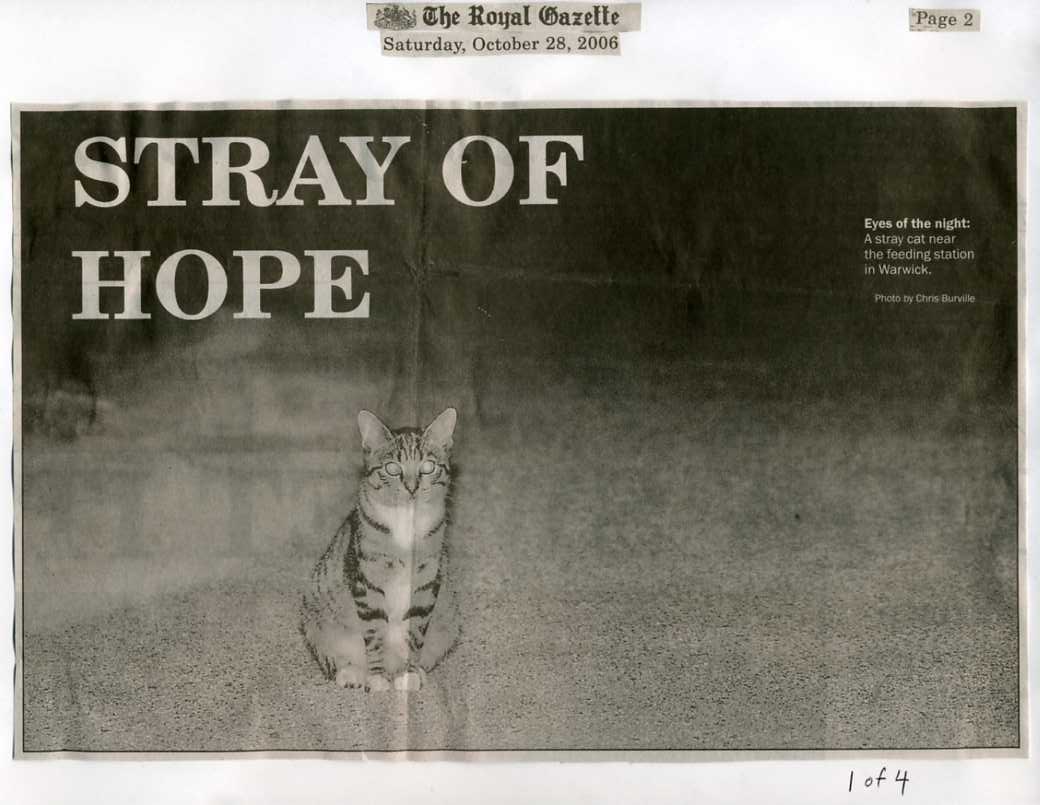
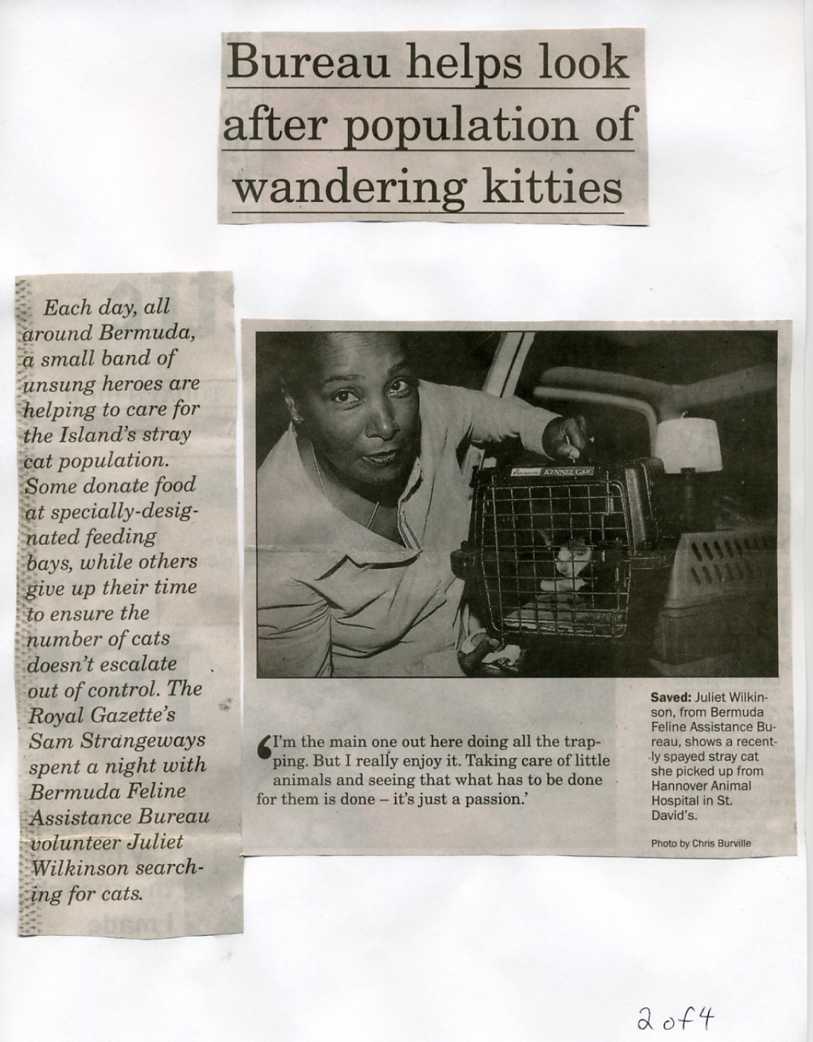
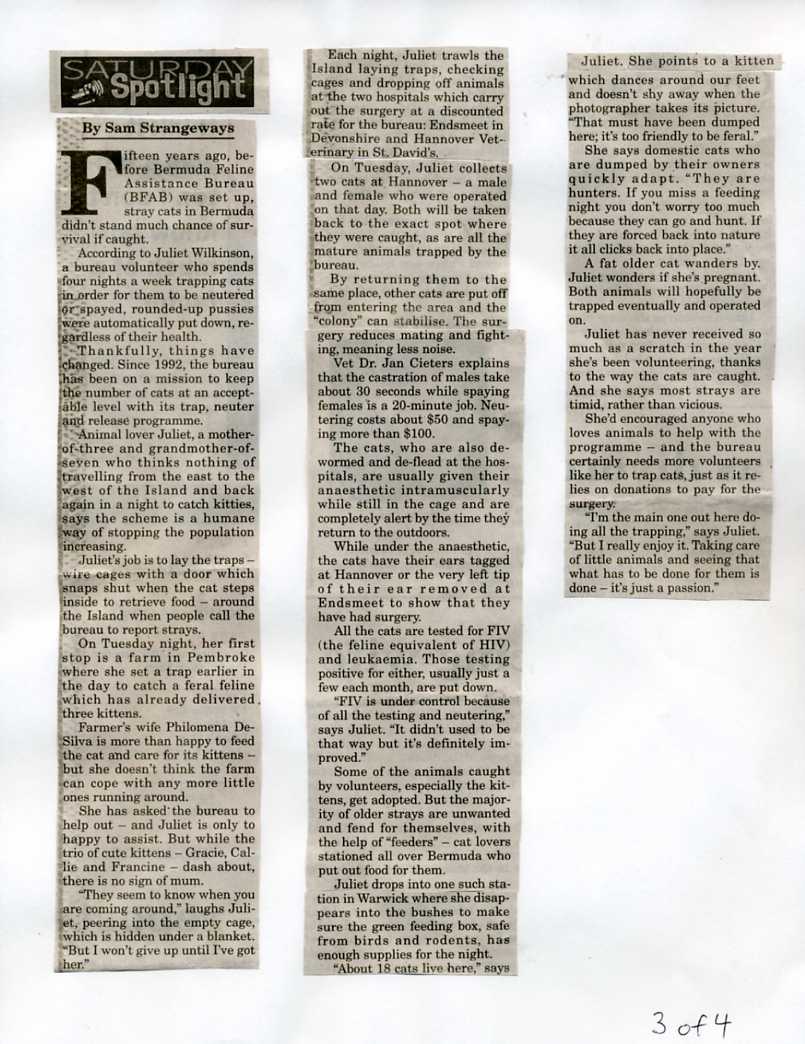
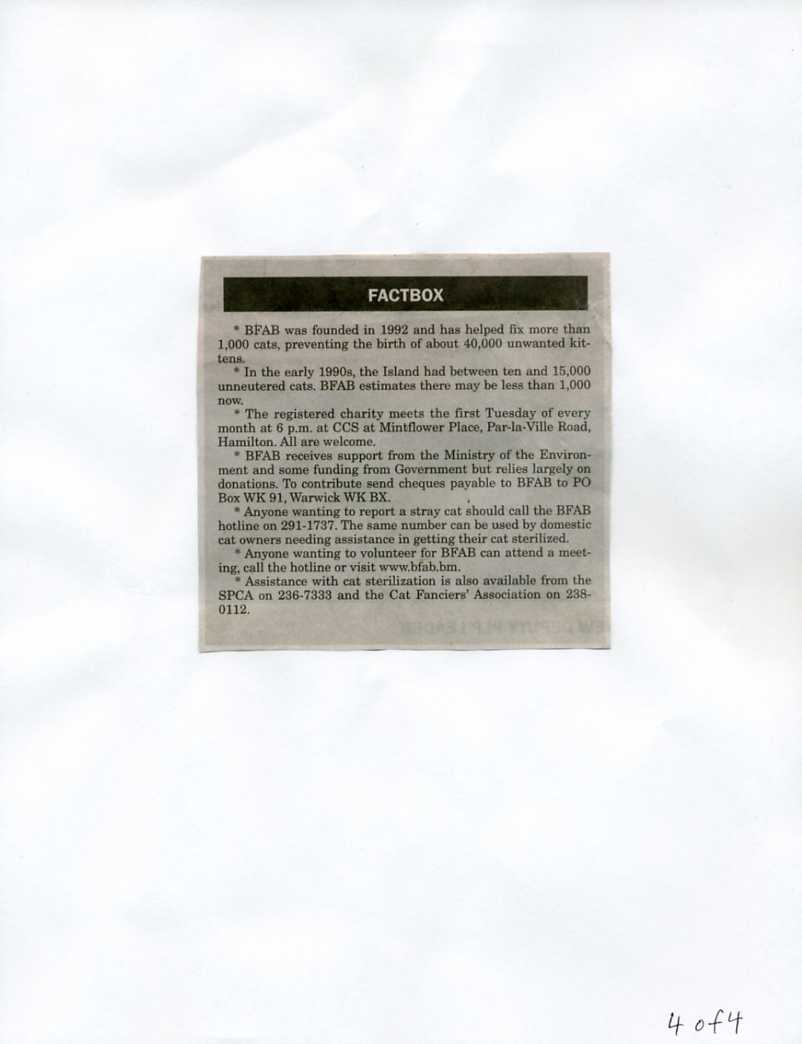
![]()
Article published September 3, 2004
Mid Ocean News
Homes needed for cats galore
by JONATHAN KENT
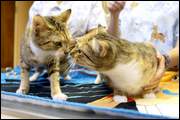
Feline friends: Two of the many cats on the island in need of a home. Described as playful and friendly, these two spayed females are currently being looked after at Endsmeet Animal Hospital. One was adopted this week, but as of yesterday the vet's also had six kittens requiring an owner.
DOZENS of cats urgently need homes as animal organisations find their accommodation inundated with kittens born this year.
Cat accommodation at the Society for the Protection of Animals (SPCA) shelter in
Paget has been packed to capacity in recent weeks and the Bermuda Feline
Assistance Bureau (BFAB) is working flat out to trap kittens born in the wild to
prepare them for domestication.
SPCA animal shelter manager Theresa Ince urged cat owners whose pets had not
been neutered or spayed to get it done.
And Ms Ince said that in August alone, the SPCA shelter had taken in 51 cats and
had managed to adopt out 33 of them.
"We have had lots of cats coming in all summer," Ms Ince said. "We traditionally
have a rush of kittens in spring, but it seems to be getting later in the year.
"Some are born in the wild and are brought to us by BFAB. Sometimes people find
kittens at the bottom of their garden and occasionally we get the mother with
the kittens, which is great because she can look after them better than we ever
could.
"But many are the result of owners not getting their cats neutered."
Over the past 11 years, BFAB has managed to drastically reduce the island's
feral cat population through a programme of trapping and neutering. Cats are
then returned to the wild to live out their natural lives while some kittens can
be domesticated.
BFAB estimates that in the early 1990s, there were anywhere from 10,000 to
15,000 cats living wild in Bermuda – now it puts the figure at around 1,000.
BFAB president Lyn Vaughan said feral kittens born in the wild were not so
numerous as in previous years but the organisation still had a problem
accommodating the glut of new arrivals.
"When the SPCA shelter is full, we have to try and find alternatives," she said.
"We have no base of our own, so we rely on the vets, who have always been very
good, and on volunteers."
Ms Vaughan, who was looking after 16 kittens at her own home, said there was a
need for people to "foster" the young animals, getting them used to living with
humans.
l Anyone interested in "fostering", or in giving a cat a home should call the
SPCA on 236-7333 or the BFAB voicemail number, 291-1737.
l Around ten pet carriers belonging to BFAB have gone missing in recent months.
Ms Vaughan believed most of the losses were down to people adopting cats from
the vet's, borrowing carriers and not bringing them back. Anyone wishing to
return a carrier or offer one to BFAB should call 291-1737.
![]()
Article published Jan 21,
2004
Cats Bill earns praise
from environmental groups
Government is on track with introducing new laws to address the Island's wild
cat problem – and earning fresh kudos from environmental groups.
Entitled the Cats Bill, the legislation will provide for a programme of
licensing and registration of domestic cats and spaying of cats not intended for
breeding.
The measures, originally announced in last year's Throne Speech, have found
their way to Cabinet Office – one of the last stops before being submitted to
Island lawmakers for approval, according to environmental group The Bermuda
Audubon Society.
"We are extremely pleased with the action that Government is taking and we've
sent our thoughts to the Ministry in praise of how far they have gotten and we
hope it will move forward quickly along with the public relations campaign which
of course we are willing to help with," said Audubon Society president Jennifer
Gray-Conklin.
She said the measures were a "very positive action" for Bermuda.
President of the Bermuda Feline Assistance Bureau (BFAB) Lyn Vaughan agreed,
saying a programme to identify cats in Bermuda was crucial to addressing the
feral cat problem.
But she cautioned that microchipping – which appears to be the way of the future
– was more expensive than other forms of identification and hoped that some cat
owners would be exempt from the procedure.
"We certainly do support the identification of cats by some means and the future
means will be microchipping. We are hoping that there will be a grandfather
clause that will allow other forms of identification," Ms Vaughan said.
"I would hope it wouldn't be demanded initially and that it would be moved in
gradually."
But she said that no one interested in the welfare of cats would oppose the
measures.
Government consulted with BFAB, the Audubon Society and other non-Governmental
organisations before drafting the bill.
Effectively the bill will make cat owners as responsible for their pets as dog
owners.
"Those who are not responsible and do not get their cats fixed will let their
cats run wild and that has always been the source of feral cats in Bermuda so
this is a key piece of legislation as far as we are concerned," Ms Vaughan said.
According to BFAB there are now probably around 1,000 feral cats on the Island –
a far cry from the roughly 10,000 to 15,000 cats that was estimated to roam the
Island in 1991.
Bermuda changed its control measures from euthanasia to spaying and neutering
which proved to be far more effective.
The Cats Bill represents another forward movement in the battle, supporters say,
and should enhance the work of organisations like BFAB.
"We are looking at a project where we will do some very serious trapping," Ms
Vaughan said.
"We plan to hire a trapper who will work very consistently on trapping and will
keep statistics on trapping. We get very few calls now about large numbers of
cats that are unneutered. We get very few calls about sick cats so definitely
we've made an enormous impact in the last 11 or so years since we've been
formally organised. This legislation will speak to the fact that the feral cat
is not native to Bermuda but is here because of man's lack of education in terms
of controlling the cats."
She said she hoped that it included compulsory neutering of non-breeding cats.
![]()
Article published February 21, 2003
BFAB-ulous! How four kittens riddled with ringworm got a new lease of life

BFAB president Lyn Vaughan with one of her furry friends
INSIGHT by JONATHAN KENT
WHEN
settlers introduced cats to Bermuda in the 19th century to help control a
burgeoning rat population, they could have had little idea of what they were
starting.
In the 21st century, the long-term effects of those actions are still
apparent, as thousands of feral cats are still wandering the island.
The Bermuda Feline
Assistance Bureau (BFAB) has made it its business to tackle that problem head-on
in a humane fashion, avoiding the need for a cull and allowing the island's wild
cats to live out healthy natural lives.
Cats are successful breeders and without human intervention the cat population
would explode.
The actions of a determined band of animal lovers have transformed what would
otherwise have been a dire situation by managing to trap and neuter almost 8,000
cats over the past ten years. Their work continues.
THE odds were stacked against the four kittens from the start. A few days old
and abandoned by their mother, they were discovered living in an abandoned
building on Court Street.
So riddled with ringworm were they, that many of the staff working to save them
at the Endsmeet Animal Hospital contracted the highly contagious fungal disease
as well.
It was recommended that the kittens be put down.
BFAB president Lyn Vaughan, who has devoted an enormous proportion of her life
to the welfare of cats since she joined the organisation in December 1994,
wanted to give the little guys one last chance.
"I thought that if we took them away from the vet's and kept them in a cage in
the fresh air, maybe that would help them to clear up the ringworm," said Ms
Vaughan.
"After seven weeks, the improvement is amazing. We haven't cleared them yet, but
soon we're confident that they'll be ready for adoption."
Endsmeet staff named the kittens Swoop, Dre, Lilkim and Foxxy after rap artists.
They still get to see them regularly as the fortunate foursome get taken in for
a weekly check-up.
Last week, Ms Vaughan loaded the characters - minus one who escaped her grasp
and ran off to explore her garden - into the back of the BFAB van and drove them
to see the vet.
In the examination room, vet Neil Burnie turned out the light and shone
ultraviolet light onto their fur. Ringworm infection shows up as luminous green.
All he could find infected were odd hairs around the ears.
"You should have seen them when they first came in," said Mr. Burnie. "They were
virtually bald and you could see great patches of green all over them."
When the disease has cleared up, they'll be ready to go to the Society for the
Prevention of Cruelty to Animals (SPCA) to be put up for adoption. Ms Vaughan
stressed that BFAB did not offer animals for adoption, the SPCA was the sole
agency for that.
Many more kittens would themselves be suffering a similar plight to the Court
Street four, were it not for the efforts of Ms Vaughan and her BFAB team, who
limit the feral cat population growth with their trapping and spaying programme.
As president of BFAB, Ms Vaughan is dedicated to cats to an almost unbelievable
degree. She sandwiches her day job between hours of setting box-shaped wire
traps where they are needed, ferrying trapped animals to the vet's for
sterilisation and organising the BFAB operation and its fund-raising efforts.
The BFAB team also includes treasurer Monika Rohlmann, secretary Valerie Wallace
and vice-president Cathy Bothello, as well as a handful of people who volunteer
to go trapping.
There are another 50 or so volunteers who look after the BFAB feeding stations,
set up wherever there are colonies of more than ten feral cats. They top up the
food and water and monitor the health of the animals.
And there are many others who assist in the fund-raising efforts. It is a huge
team effort and it costs money.
"For our vet bills alone, we are looking at about $100,000 a year," said Ms
Vaughan. "At busy times, we are spending $12,000 a month.
"We use different vets on the island and we rely very much on their co-operation
in fitting us in. And because we are a charitable organisation, they try to give
us a reasonable price for neutering."
BFAB's own success in sterilising nearly 8,000 cats over the past ten years has
had a noticeable effect in reducing their own workload. "There was a time when
we booked the vets for 30 cats a day," said Ms Vaughan. "Now it's more like six
to eight cats a day.
"Up until two years ago, there were two cat shelters, one at Ocean View as well
as the SPCA. And for years there were dozens of kittens looking for homes. Now
the situation has changed and there are dozens of people looking for kittens to
adopt. That is a sign that we are succeeding.
"Our objective is to have no cats living in the wild. And we do see a definite
decline in the long term. In some places where there used to be colonies of 30
cats, there are now five or less."
In decades past, Bermuda had a substantial number of feral dogs, who were
predators to feral cats and thereby kept the feline population down.
In the 1970s, Bermuda's enforcement of new laws brought the feral dog population
under control and effectively removed the main predator to cats.
At that time, the SPCA operated a feline "trap-and-destroy" programme, which had
little impact on the feral cat population. In the early 1990s, the SPCA became a
"no kill" shelter organisation and ceased to have any involvement with feral
cats.
A group of people concerned about the problem of feral cats in Bermuda started
BFAB (originally known as the Bermuda Feline Aid & Assistance Bureau) in 1992. A
major source of feral cats is the un-neutered domestic cat population. And BFAB
would like to see legislation introduced to rectify that situation and it
believes there would be support among the powers that be.
"We would welcome a law that made neutering of all pet cats compulsory and
breeding licences for all owners of cats to be bred," Ms Vaughan said. "Dogs are
microchipped and we would like to see a similar scheme brought in for cats, so
owners could be traced easily. I do know there are many MPs who own cats and who
would support action for the welfare of the cat population."
As well as neutering adult animals, BFAB tries to remove feral kittens from the
wild and take them to the SPCA for adoption.
This time of year is a critical one for BFAB. Unsterilised female cats coming
into season now need to be trapped and neutered to avoid as many new kittens in
April - usually the peak time for new births - as possible. The feline gestation
period is just nine weeks and it is possible for them to have several litters in
a year. "In one area last week, we trapped four cats who were on heat," said Ms
Vaughan. "So in that one area, we have really changed the odds."
To achieve its aims, BFAB relies heavily on the community to pinpoint problem
areas. The sound of tom cats howling is the cue to ring them. Ms Vaughan
appealed for anyone who had seen feral cats thought to be unsterilised in their
area to call the BFAB voice mail on 291-1737 and to leave contact numbers as
well as details of the location.
They rely on people who know the cats for information on where and when they
feed and what they like to eat. If traps are put out at the time cats are used
to getting fed and baited with a food they generally like, then trapping is
likely to be succesful. BFAB traps are never placed on people's property without
permission.
"When people call us, they should know we have a three-month waiting list,
because we still don't have a designated trapper in place," said Ms Vaughan.
"Sometimes it may be possible to respond much more quickly than that. And I
would encourage anyone who feels that we have not responded to their request for
trapping to recall us. We have had a few problems with our voice mail service.
"We are also conscious that cats are not appreciated by everyone. And we do act
quickly when we hear of cats in nature reserves. We had an instance where there
was a mother cat at Spittal Pond. We had a trapper who spent three weeks trying
to catch it. Eventually we caught it.
"We rehomed it at one of our feeding stations. That is very difficult to do
because cats like their own area and will go to great lengths to go back there
when they've been moved."
BFAB also get calls about feral cats in distress, particularly those suffering
from illnesses such as cancer, feline Aids or feline leukaemia. "When a feral
cat tests positive for Aids or leukaemia, we automatically euthanise it," said
Ms Vaughan. "If the disease travels through cats it can be devastating, so we
need to protect the domestic cat population as well as feral cats.
"Feline Aids works like human Aids. It can make a cat waste away. A cat
suffering from the disease may look so emaciated you can't believe it's still
alive.
"Cancer is fairly common. We got several calls about a cat at Dockyard who had
cancerous tumour that had burst and he was trailing ligaments from his leg.
"I went up there at four in the afternoon, at midnight and at 5 a.m., but he was
not co-operative in getting caught. Eventually, someone up there cornered him at
the top of the steps at the back of the Clock Tower. I took a carrier up there
and he was so weak he just walked into it for the food.
"Another time I got a call about a cat in Somerset who had a burst tumour on its
face. It looked awful. There were children in the area and the man who called
said he didn't want the children to have to see that.
"It can be very difficult to deal with problems like that, but at least you know
you have prevented further suffering."
BFAB has no base. In the main part of its work, cats are trapped, taken to the
vet's and neutered, and returned to their territory on the same day, so there is
usually no need for a shelter.
And the organisation can count on several volunteers who foster kittens for a
few weeks - in their own homes - before they go off to the SPCA for adoption.
Considering her earliest feline recollection, Ms Vaughan's devotion to cats is
all the more remarkable.
"One of my earliest memories was at the age of three, bending down to stroke a
ginger cat," she said. "The next thing I knew I was coming to in hospital with
stitches in my scalp. I was told he had jumped up at my head and had scratched
me to get away. Now I have four ginger cats of my own as well as a three-legged
tabby and a dark tortoiseshell.
"I've always loved cats. Their fur and their variety of markings are amazing.
But I love all animals and nature. I just felt there was a job for me to do in
this area. I'm Bermudian, I can drive a van and I'm willing to devote a
considerable amount of time for the welfare of feral cats."
BFAB will be holding a tag day to raise funds at Supermart on Front Street
tomorrow.
The organisation is looking for assistance, particularly in the Devonshire,
Pembroke and Paget areas, and particularly to help with fund-raising and
organisation of the BFAB cat show at Number One Shed on March 22. Members meet
at 6 p.m. on the first Tuesday of every month. Anyone interested should leave a
message on the BFAB voice mail on 291-1737.
BFAB is on the internet as www.bfab.bm and web browsers can email BFAB
through the site
